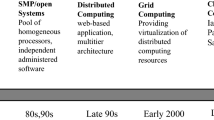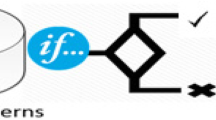Abstract
As a common way to identify anomalous data, outlier detection is widely applicable for intrusions detection, adverse reactions analysis, financial fraud prevention, etc. The accuracy of outlier detection depends crucially on the number of data involved in the test, i.e., the more data participate in detection, the higher accuracy we get. For this reason, cross-dataset collaborative outlier detection is introduced to conquer the lack of data in a single-dataset setting. However, privacy concerns seriously prevent the application of collaborative outlier detection, since most organization are unwilling to share their data with others directly in practice. In this paper, we present efficient protocols for privacy preserving collaborative outlier detection from arbitrarily partitioned data using Local Distance-based Outlier Factor (LDOF). Our protocols fall in the two-server model where data owners distribute their private data among two non-colluding servers who detect outlier on the joint data by secure two-party computation. In particular, we perform arithmetic operations which takes place inside LDOF on arithmetic circuits instead of boolean circuits, and perform sorting operations on boolean circuits. Such a design enables standard operations are performed with suitable circuits, and thus our scheme is more efficient. In addition, to further improve protocol efficiency, local sensitive hash (LSH) is utilized to filter out data which do not need secure computation to reduce the the amount of shared data. We implement our system in C++ on real data. The security analysis and experiments show the security and efficiency of the proposed scheme. Our protocols are more faster than the state of previous methods.



Similar content being viewed by others
References
Atallah M, Du W (2001) Privacy-preserving cooperative statistical analysis. In: 17th annual computer security applications conference (ACSAC’01), pp 102–110
Qin Z, Chen F, Wang Q, Liu AX (2012) Towards high performance security policy evaluation[J]. J Supercomput (Springer) 16(59):1577–1595
Xu G, Li H, Ren H, Yang K, Deng RH (2019) Data security issues in deep learning: Attacks, countermeasures and opportunities. IEEE Commun Mag 57(11):116–122
Hao M, Li H, Luo X, Xu G, Yang H, Liu S (2019) Efficient and privacy-enhanced federated learning for industrial artificial intelligence, IEEE Transactions on Industrial Informatics
Xu G, Li H, Liu S, Yang K, Lin X (2020) VerifyNet: Secure and verifiable federated learning. IEEE Trans Inf Foren Secur 15(1):911–926
Xu G, Li H, Dai Y, Yang K, Lin X (2019) Enabling efficient and geometric range query with access control over encrypted spatial data. IEEE Trans Inf Foren Secur 14(4):870–885
Ren H, Li H, Dai Y, Yang K, Lin X (2018) Querying in internet of things with privacy preserving: Challenges, solutions and opportunities. IEEE Netw 32 (6):144 ⋅⋅C 151
Li H, Yang Y, Dai Y, Yu S, Xiang Y (2017) Achieving secure and efficient dynamic searchable symmetric encryption over medical cloud data, IEEE Transactions on Cloud Computing
Xu G, Li H, Liu S, Wen M, Lu R (2019) Efficient and privacy-preserving truth discovery in mobile crowd sensing systems. IEEE Trans Veh Technol 68(4):3854–3865
Li H, Liu D, Dai Y, Luan TH, Yu S (2018) Personalized search over encrypted data with efficient and secure updates in mobile clouds. IEEE Trans Emerg Topics Comput 6(1):97–109
Jiang W, Li H, Xu G, Mi W, Dong G, Lin X (2019) PTAS: Privacy-preserving thin-client authentication scheme in blockchain-based PKI. Future Gener Comput Syst 96:185–195
Vaidya J, Clifton C (2004) Privacy-preserving outlier detection. In: 4th IEEE international conference on data mining, pp 233–240
Shaneck YKM, Kumar V (2009) Privacy preserving nearest neighbor search. In: 6th IEEE Int. Conf Data Mining Workshop, pp 247–276
Ng RT, Breunig MM, Kriegel H-P, Sander J (2000) Lof: Identifying density-based local outliers. 93-104 ACM SIGMOD Rec
Vaidya J, Asif H, Talukdar T (2018) Differentially private outlier detection in a collaborative environment, International Journal of Cooperative Information Systems, 27(03)
Jin H, Zhang K, Hutter M (2009) A new local distance-based outlier detection approach for scattered real-world data, Pacific-Asia Conference on Knowledge Discovery and Data Mining. Springer, Berlin
Ioannidis S, Weinsberg U, Joye M, Taft N, Nikolaenko V, Boneh D (2013) Privacy-preserving matrix factorization. In: ACM SIGSAC conference on computer communications security, pp 801–812
Weinsberg U, Ioannidis S, Joye M, Boneh D, Nikolaenko V, Taft N (2013) Privacy-preserving ridge regression on hundreds of millions of records. IEEE symposium on security & privacy. IEEE Computer Society, pp 334–348
LINDELL Y., PINKAS B (2009) A proof of security of yao’s protocol for two-party computation, 161-188 Journal of Cryptology
Asharov LY, Schneider G (2013) More efficient oblivious transfer and extensions for faster secure computation. In: ACM SIGSAC conference on Computer & communications security, pp 535–548
Kilian J, Nissim K, Ishai Y, Petrank E (2003) Extending oblivious transfers efficiently. In: 23rd annual international cryptology conference. CiteSeer, pp 145–161
Asharov T, Schneider G, Lindell Y, Zohner M (2013) More efficient oblivious transfer and extensions for faster secure computation. In: ACM CCS’13, pp 535–548
Nielsen C, Orlandi JB, Nordholt PS, Burra SS (2012) A new approach to practical active-secure two-party computation. In: Cryptology conference on advances in Cryptology-crypto, pp 681–700
Schneider T, Demmler D, Zohner M (2015) Aby-a framework for efficient mixed-protocol secure two-party computation, Network and Distributed System Security Symposium
Beaver D. (1991) Efficient multiparty protocols using circuit randomization. In: CRYPTO 91, ser. LNCS, vol 576, pp 420–432. Springer
Nisan N, Pinkas B, Sella Y (2004) Fairplay-a secure two-party computation system. In: 13th conference on USENIX security symposium, vol 13, pp 20–20
Mohassel P, Kamara S (2011) Outsourcing multiparty computation, IACR Cryptology ePrint Archive
CANETTI R (2001) Universally composable security: A new paradigm for cryptographic protocols. In: 42nd IEEE symposium on foundations of computer science, pp 136–145
Zhang Y, Mohassel P (2017) Secureml: A system for scalable privacy-preserving machine learning. In: IEEE Symposium on Security and Privacy (SP) - San Jose, CA, USA, pp 19–38
Indyk P, Datar M, Immorlica N (2004) Localitysensitive hashing scheme based on p-stable distributions. In: 12th ann. symp. comput geometry, pp 253–262
Yin H, Qin Z, Ou L et al (2017) A query privacy-enhanced and secure search scheme over encrypted data in cloud computing[J]. J Comput Syst Sci 90:14–27
Ou L, Yin H, Qin Z, Xiao S, Yang G, Hu Y (2018) An efficient and privacy-preserving multi-user cloud-based LBS query scheme, Security and Communication Networks
Lu C-S, Hsu C-Y (2009) Secure and robust sift. In: ACM 17th Int. Conf. Multimedia, pp 637–640
Andoni A, Indyk P (2006) Near-optimal hashing algorithms for approximate nearest neighbor in high dimensions. In: IEEE 47th Ann. Symp. Found. Comput Sci, pp 459–468
Gmp library, https://gmplib.org
Ntl library, http://www.shoup.net/ntl
Yang W, Li L, Huang L (2013) Privacy-preserving lof outlier detection. Knowl Inf Syst 42 (3):579–597
Acknowledgments
This work is supported by the Key Program of NSFC-Tongyong Union Foundation under Grant U1636209, the National Natural Science Foundation of China under Grant 61902292, the Key Research and Development Programs of Shaanxi under Grant 2019ZDLGY13-07 and 2019ZDLGY13-04.
Author information
Authors and Affiliations
Corresponding author
Additional information
Publisher’s note
Springer Nature remains neutral with regard to jurisdictional claims in published maps and institutional affiliations.
This article belongs to the Topical Collection: Special Issue on Security and Privacy in Machine Learning Assisted P2P Networks
Guest Editors: Hongwei Li, Rongxing Lu and Mohamed Mahmoud
Rights and permissions
About this article
Cite this article
Wei, Z., Pei, Q., Liu, X. et al. Efficient distributed privacy-preserving collaborative outlier detection. Peer-to-Peer Netw. Appl. 13, 2260–2271 (2020). https://doi.org/10.1007/s12083-020-00903-8
Received:
Accepted:
Published:
Issue Date:
DOI: https://doi.org/10.1007/s12083-020-00903-8




